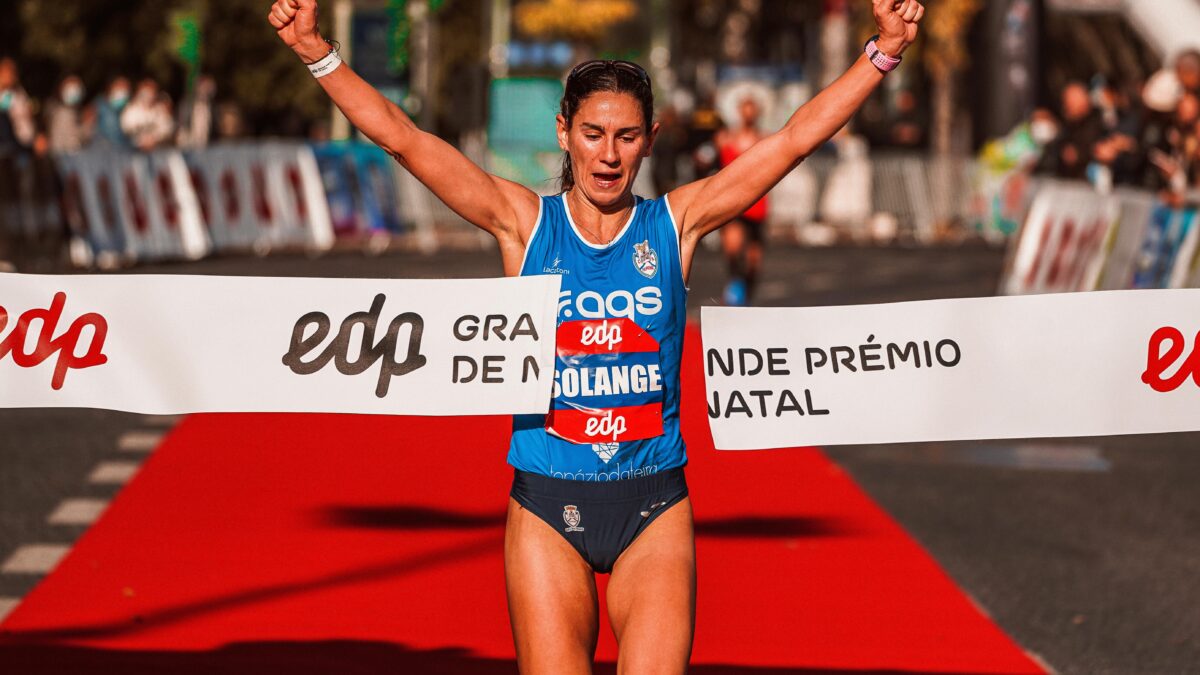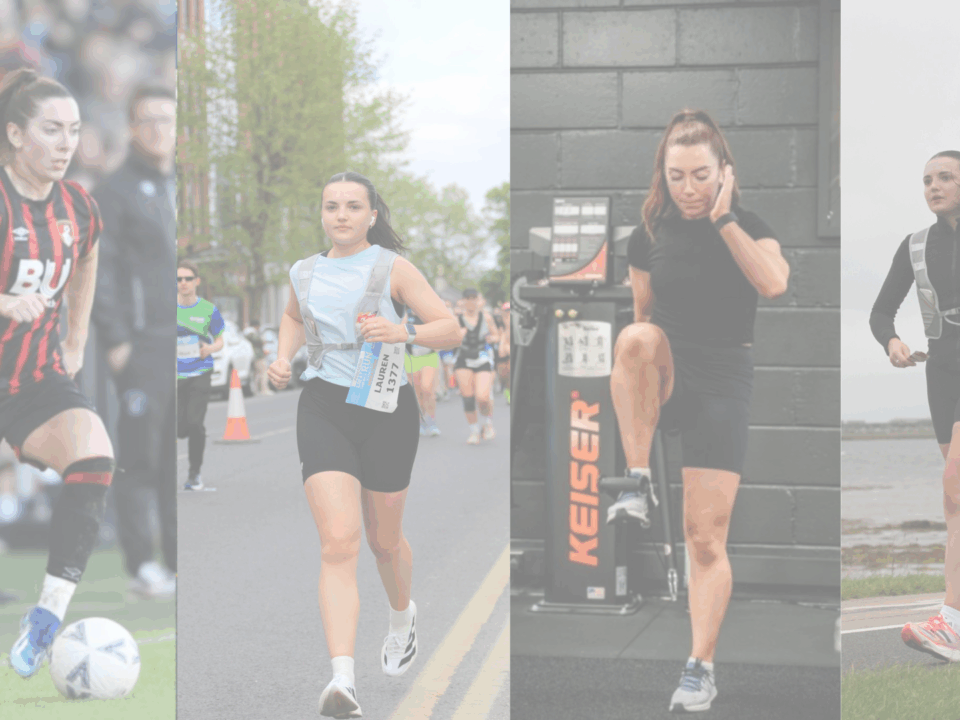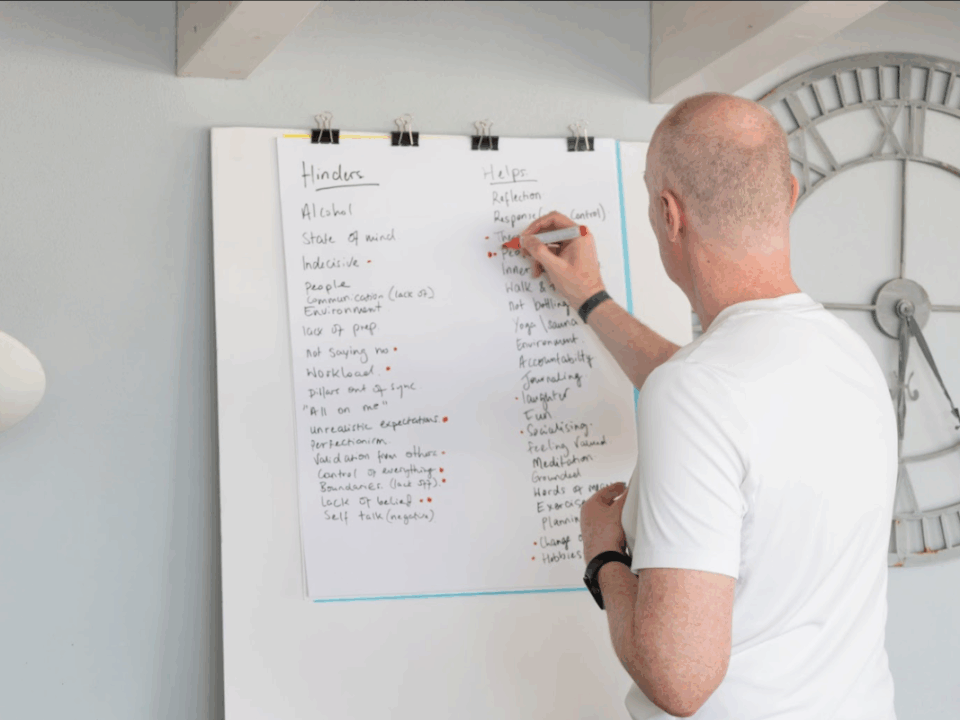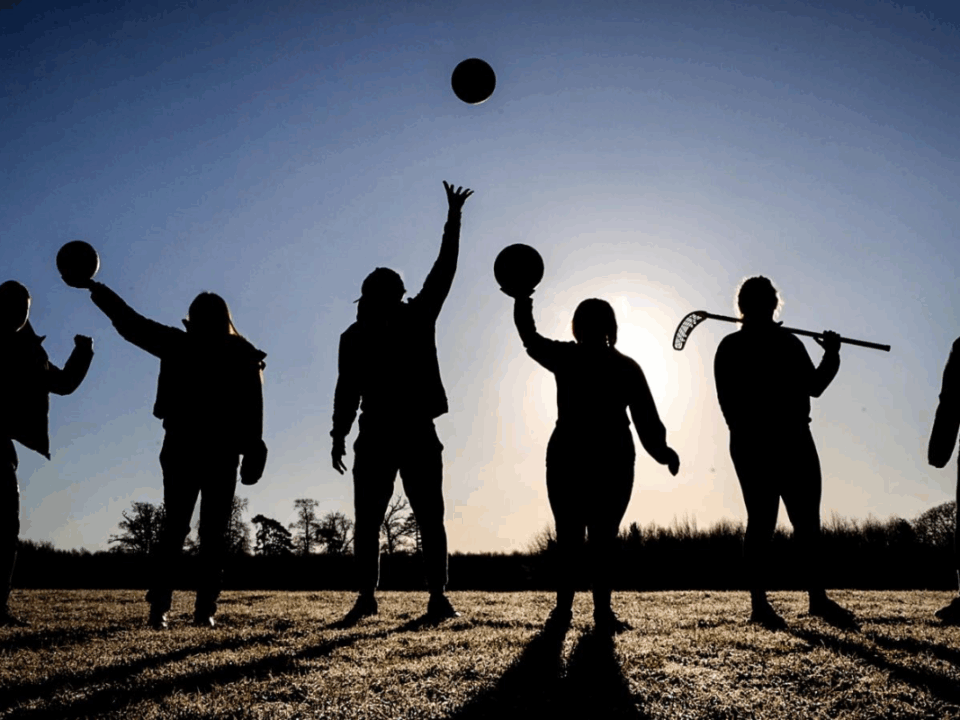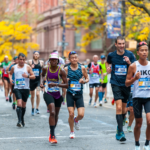
Fueling for Your Marathon Part 3: How many carbs do you need?
August 8, 2025
The Challenge of Enjoyment in Sport
September 3, 2025
Fueling for Your Marathon Part 3: How many carbs do you need?
August 8, 2025
The Challenge of Enjoyment in Sport
September 3, 2025Fueling for Your Marathon Part 4: How To Be Race Day Ready & Recover Like A Pro
Race day is not the time to guess or hope your fueling will work. It’s where all your training, long runs, gut training, and carb loading come together. This final part in our 4-part series will show you how to execute your nutrition plan from the morning of your race through the recovery after the finish line.
At this point, your fueling should be locked in so you can focus on what really matters – running your race.
Why It Matters
Not only do you need a proper fueling strategy for race day, you need a fueling strategy that you have tried and feel confident in for before and after. Getting this right means avoiding:
- Low energy stores and hitting a wall
- Dehydration with symptoms such as dizziness or decreased focus
- GI issues pre or mid-race
- Extreme prolonged muscle soreness post-race
We want this to all be tested and perfected by the time of your marathon, because you will encounter enough variables on race day and nutrition shouldn’t be one.
Race Morning: Keep it simple, keep it consistent
The day of your race, your carb-load is nearly complete. Your glycogen stores are close to full and the majority of your eating has been done. You just need one last top up of carbohydrates to help maximize your energy levels the day of your race. 3-4 hours before the start, have a low-fibre, low-fat, and carb-rich breakfast that you’ve tested and used successfully in training. Depending on your race time, you may want one final top up 30-60 minutes before that is carb-based.
Good breakfast options include:
- Porridge with banana and honey
- White toast with jam
- Pancakes or bagel with honey
- A bowl of cereal with milk
- Yoghurt with granola and a glass of juice
Optional top up snack (30–90 mins before):
- Banana
- Sports drink
- Yoghurt covered rice cakes
- Cereal bar
- Jellies
- Pancake with honey
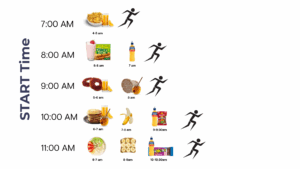
During the Race: Fuel & Hydrate
As discussed in Part 2, you should have your intra-run fueling plan in place by race day. Make sure you are hitting the below targets during your marathon for carb intake and hydration.
Carbohydrate target: 30-60g per hour (start fueling at about 30-40 mins into the race)
Fluid target: Sip 400-800ml per hour, with ~300-600mg sodium per hour depending on your needs and race conditions
After the Finish Line: Recover Smart
Recovery starts the moment you cross the finish line. Prioritise the 4 R’s of recovery post-race to minimise soreness and maximise turn around post-race:
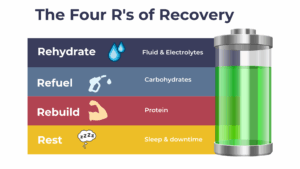
Replenish your carbohydrate stores that you’ve used up during your race by having a carb-rich meal within 2 hours post-race. If your meal will be delayed, have a carb-rich snack within 30-60 minutes after you cross the finish line.
Repair the muscle damage that occurs during the race with protein. Again, aim for a meal within an hour or 2 post-race or have a snack with a source of carb and protein within 30-60 minutes after completion.
Rehydrate using mainly water post-race, or utilize carb rich drinks such as milk, juice, or sports drinks. Electrolytes may be needed depending on conditions and your needs, or whether you were able to replenish electrolytes properly during the race.
*Chocolate milk or a protein milk is a great source of carbs, protein, hydration, and electrolytes post-race!
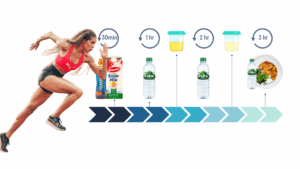
Rest, aiming for a minimum of 8 hours the night after a race and utilising naps as needed. Also make sure to plan downtime into the days following as relaxation and rest are the most important parts of recovery.
Examples of snacks or meals to have within 30-60 minutes post-race:
- Smoothie with fruit, oats, and whey
- Turkey sandwich + glass of juice
- Protein milk + banana + cereal bar
- Chicken wrap + glass of milk
- Hard boiled eggs + toast
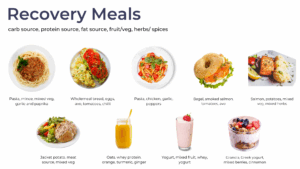
Putting It Into Practice
Now’s the time to lock in your race-day nutrition plan.
Choose one of your final long runs or tune-up races to test:
- Your pre-run meal timing
- Gel spacing and fluid strategy
- Recovery snack timing post-run
Take note of how you feel. Adjust as needed. And remember, nothing new on race day. Familiar food = calm gut, calm mind.
You’re Ready-What’s Next?
If you’ve followed this series, you’re already ahead of the curve.
But if you still have questions or want help personalising your final race-day plan, join us for the:
🎯 Marathon Fueling Webinar – August 18th @ 7:30pm
Hosted by performance nutritionists at daveynutrition
Save your seat here
Replay available for all who register.
8 Week Marathon Nutrition Programme
Want more personlised support? Work through our step by step programme with support and guidance from our team or choose to work 1:1 alongside the main programme with our more comprehensive options for more individualised support. Check out our support options here and sign up today.
References
Burke, L. & Hawley, J. (2018). Swifter, higher, stronger: What’s on the menu? Science, 362, 781–787. https://doi.org/10.1126/science.aau2093
Tiller, N. et al. (2019). Nutritional considerations for ultra-marathon training and racing. JISSN, 16. https://doi.org/10.1186/s12970-019-0312-9
Bennett, J. & Kehoe, M. (2008). Marathon fueling techniques: A proposed intake schedule. Strength & Conditioning Journal, 30, 56–65. https://doi.org/10.1519/SSC.0B013E318187F1B5
Fueling for Your Marathon Part 4: How To Be Race Day Ready & Recover Like A Pro
Race day is not the time to guess or hope your fueling will work. It’s where all your training, long runs, gut training, and carb loading come together. This final part in our 4-part series will show you how to execute your nutrition plan from the morning of your race through the recovery after the finish line.
At this point, your fueling should be locked in so you can focus on what really matters – running your race.
Why It Matters
Not only do you need a proper fueling strategy for race day, you need a fueling strategy that you have tried and feel confident in for before and after. Getting this right means avoiding:
- Low energy stores and hitting a wall
- Dehydration with symptoms such as dizziness or decreased focus
- GI issues pre or mid-race
- Extreme prolonged muscle soreness post-race
We want this to all be tested and perfected by the time of your marathon, because you will encounter enough variables on race day and nutrition shouldn’t be one.
Race Morning: Keep it simple, keep it consistent
The day of your race, your carb-load is nearly complete. Your glycogen stores are close to full and the majority of your eating has been done. You just need one last top up of carbohydrates to help maximize your energy levels the day of your race. 3-4 hours before the start, have a low-fibre, low-fat, and carb-rich breakfast that you’ve tested and used successfully in training. Depending on your race time, you may want one final top up 30-60 minutes before that is carb-based.
Good breakfast options include:
- Porridge with banana and honey
- White toast with jam
- Pancakes or bagel with honey
- A bowl of cereal with milk
- Yoghurt with granola and a glass of juice
Optional top up snack (30–90 mins before):
- Banana
- Sports drink
- Yoghurt covered rice cakes
- Cereal bar
- Jellies
- Pancake with honey

During the Race: Fuel & Hydrate
As discussed in Part 2, you should have your intra-run fueling plan in place by race day. Make sure you are hitting the below targets during your marathon for carb intake and hydration.
Carbohydrate target: 30-60g per hour (start fueling at about 30-40 mins into the race)
Fluid target: Sip 400-800ml per hour, with ~300-600mg sodium per hour depending on your needs and race conditions
After the Finish Line: Recover Smart
Recovery starts the moment you cross the finish line. Prioritise the 4 R’s of recovery post-race to minimise soreness and maximise turn around post-race:

Replenish your carbohydrate stores that you’ve used up during your race by having a carb-rich meal within 2 hours post-race. If your meal will be delayed, have a carb-rich snack within 30-60 minutes after you cross the finish line.
Repair the muscle damage that occurs during the race with protein. Again, aim for a meal within an hour or 2 post-race or have a snack with a source of carb and protein within 30-60 minutes after completion.
Rehydrate using mainly water post-race, or utilize carb rich drinks such as milk, juice, or sports drinks. Electrolytes may be needed depending on conditions and your needs, or whether you were able to replenish electrolytes properly during the race.
*Chocolate milk or a protein milk is a great source of carbs, protein, hydration, and electrolytes post-race!

Rest, aiming for a minimum of 8 hours the night after a race and utilising naps as needed. Also make sure to plan downtime into the days following as relaxation and rest are the most important parts of recovery.
Examples of snacks or meals to have within 30-60 minutes post-race:
- Smoothie with fruit, oats, and whey
- Turkey sandwich + glass of juice
- Protein milk + banana + cereal bar
- Chicken wrap + glass of milk
- Hard boiled eggs + toast

Putting It Into Practice
Now’s the time to lock in your race-day nutrition plan.
Choose one of your final long runs or tune-up races to test:
- Your pre-run meal timing
- Gel spacing and fluid strategy
- Recovery snack timing post-run
Take note of how you feel. Adjust as needed. And remember, nothing new on race day. Familiar food = calm gut, calm mind.
You’re Ready-What’s Next?
If you’ve followed this series, you’re already ahead of the curve.
But if you still have questions or want help personalising your final race-day plan, join us for the:
🎯 Marathon Fueling Webinar – August 18th @ 7:30pm
Hosted by performance nutritionists at daveynutrition
Save your seat here
Replay available for all who register.
8 Week Marathon Nutrition Programme
Want more personlised support? Work through our step by step programme with support and guidance from our team or choose to work 1:1 alongside the main programme with our more comprehensive options for more individualised support. Check out our support options here and sign up today.
References
Burke, L. & Hawley, J. (2018). Swifter, higher, stronger: What’s on the menu? Science, 362, 781–787. https://doi.org/10.1126/science.aau2093
Tiller, N. et al. (2019). Nutritional considerations for ultra-marathon training and racing. JISSN, 16. https://doi.org/10.1186/s12970-019-0312-9
Bennett, J. & Kehoe, M. (2008). Marathon fueling techniques: A proposed intake schedule. Strength & Conditioning Journal, 30, 56–65. https://doi.org/10.1519/SSC.0B013E318187F1B5
Upgrade NOW
Upgrade NOW


